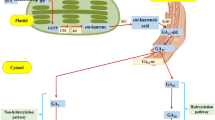Abstract
Seed germination, seedling growth, mitotic and nucleolar activity were investigated as indicators of metabolic activity in a diploid wheat, Triticum monococcum ssp. monococcum cv. Einkorn. Two developmental phases were identified, an initial lag phase during which reactivation of NOR's and the initiation of mitotic activity (10 h) took place prior to the appearance of the primary root (16 h). Dominance interactions were observed between the NOR's of chromosomes 1A and 5A with the NOR's of the one pair activated before the other and forming therefore larger nucleoli. The total number of nucleoli per 500 cells also varied according to the stages of the cell cycle over time. The mitotic activity had an initial exponential rise, but showed signs of flattening out after 10 h of mitosis with opposite levels of activity in the primary and first pair of lateral roots thereafter. Secondly, an exponential phase in root and shoot growth, mobilization of reserve food and respiration rate was observed during seedling growth. Comparisons were done on work from a previous investigation on two polyploid wheat accessions belonging toT. turgidum ssp. durum and T. aestivum species. T. monococcum displayed a higher embryo growth than the polyploids, that may be explained by having a lighter embryo and caryopsis weight that may influence the uptake of water and reactivation of metabolic activity. During the seedling growth period, the two polyploid species displayed a faster growth rate than the diploid probably due to the differences in the number of genomes, the hybrid nature of the polyploids and a more complex gene control in the polyploids.
Similar content being viewed by others
References
Bennett, M.D. & J.B. Smith, 1972. The effects of polyploidy on meiotic duration and pollen development in cereal anthers. Proc R Soc Lond B 181: 81–107.
Bouaziz, A. & D.R. Hicks, 1990. Consumption of wheat seed reserves during germination and early growth as affected by soil water potential. Plant and Soil 128: 161–165.
Darvey, N.L. & C.J. Driscoll, 1972. Nucleolar behaviour in Triticum. Chromosoma 36: 131–139.
Davies, P.O.L. & H. Rees, 1975. Mitotic cycles in Triticum species. Heredity 35(3): 337–345.
Dobrzanska, M., M. Tomaszewski, Z. Grzelczak, E. Rejman & J. Buchowicz, 1973. Cascade activation of genome transcription in wheat. Nature 244: 507–509.
Dubcovsky, J., J. Dvo?rák, 1995. Ribosomal RNA Multigene Loci: Nomads of the Triticeae Genomes. Genetics 140: 1367–1377.
Hampton, J.G., 1981. The extent and significance of seed size variation in New Zealand wheats (Triticum aestivum L.). NZJ Exp Agric 9: 179–184.
Jiang, J. & B.S. Gill, 1994. New 18S?26S ribosomal RNA gene loci: chromosomal landmarks for the evolution of polyploid wheats. Chromosoma 103: 179–185.
Kaltsikes, P.J., 1971. The mitotic cycle in an amphiploid (Triticale) and its parental species. Can J Genet Cytol 13: 656–662.
Lafond, G.P. & R.J. Baker, 1986. Effects of temperature, moisture stress, and seed size on germination of nine spring wheat cultivars. Crop Sci 26: 563–567.
Marcus, A., J. Feeley & T. Volcani, 1966. Protein synthesis in imbibed seeds III. Kinetics of amino acid incorporation, ribosome activation and polysome formation. Plant Physiol 41: 1167–1172.
Medina, F.J., A. Cerdido & M.E. Fernández-Gómez, 1995. Components of the nucleolar processing complex (pre-rRNA, fibrillarin, and nucleolin) colocalize during mitosis and are incorporated to daughter cell nucleoli. Exp Cell Res 221: 111–125.
Miller, T.E., J. Hutchinson & S.M. Reader, 1983. The identification of the nucleolus organiser chromosomes of diploid wheat. Theor Appl Genet 65: 145–147.
Mory, Y.Y., D. Chen & S. Sarid, 1972. Onset of deoxyribonucleic acid synthesis in germinating wheat embryos. Plant Physiol 49: 20–23.
Pienaar, R. de V., 1955. Combinations and variations of techniques for improved chromosome studies in the Gramineae. J of SA Botany 21: 1–8.
Simon, E.W. & A. Meany, 1965. Utilization of reserves in germinating Phaseolus seeds. Plant Physiol 40: 1136–1139.
Sumner, A.T., 1990. Chromosome Banding. Unwin Hyman, London.
Von Well, E. & A. Fossey, 1998. A comparative investigation of seed germination, metabolism and seedling growth between two polyploid Triticum species. Euphytica 101: 83–89.
Von Well, E. & A. Fossey, 1999. A comparison of NOR activity in seminal root tip cells of two polyploid wheat (Triticum) species. Seed Sci & Technol 27: 645–655.
Author information
Authors and Affiliations
Rights and permissions
About this article
Cite this article
von Well, E., Fossey, A. Metabolism, seedling growth and nucleolar activity in germinating diploid wheat Triticum monococcum ssp. monococcum cv. Einkorn. Euphytica 124, 47–54 (2002). https://doi.org/10.1023/A:1015647923521
Issue Date:
DOI: https://doi.org/10.1023/A:1015647923521




